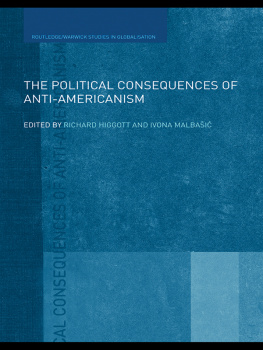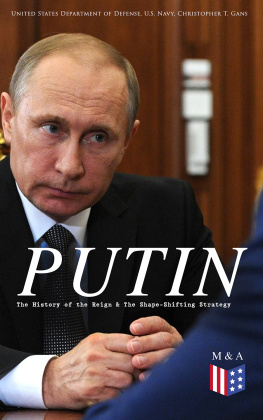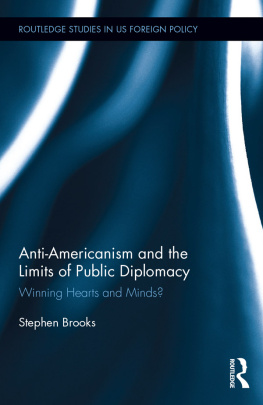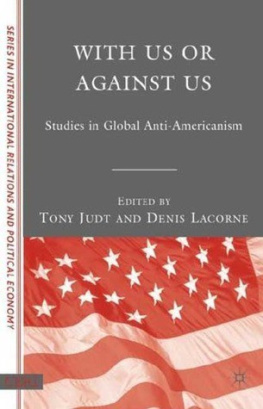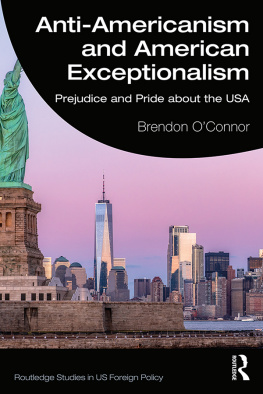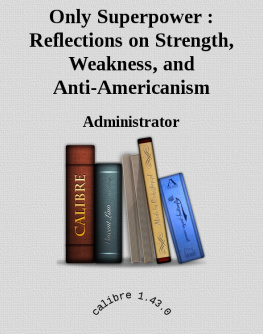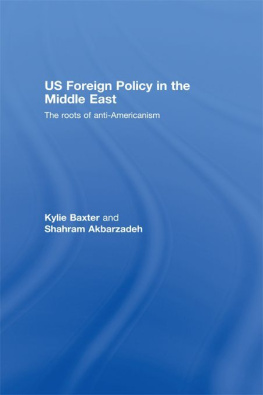The Political Consequences of Anti-Americanism
Anti-Americanism as a concept is confused, often used in a contradictory fashion and invariably driven by emotion rather than intellect. Nevertheless, it casts a long policy shadow with adverse consequences (both real and potential) for actors including those who may not support the concept.
This book puts anti-Americanism into a contemporary context and analyses some of its political consequences. The argument of the book is that ideas matter: they shape actions and have policy consequences. With the case of anti-Americanism, even superficial ideas can reflect deep-seated emotions that might, at first sight, appear real. These can range from the rhetorical flourish and smart comment occasioned by a presidential gaucherie through to a deeply embedded, visceral hatred of all things American. The contributors to this volume discern the difference between these two ends of the anti-American spectrum and assess the varying degree of political consequence. Divided into three parts, items addressed include:
- Networks, Culture and Foundationsconsisting of the role of influential foundations and think tanks in combating anti-Americanism, and the link between the political establishment in Washington DC and the popular culture industry;
- Security and Anti-Americanism;
- Regional and Country Studiesincluding those of Canada, Australia, East Asia, Latin America, Greece and France.
The Political Consequences of Anti-Americanism will be of interest to students and scholars of politics, international relations, security studies, American politics and American foreign policy.
Richard Higgott is a Pro Vice-Chancellor and Professor of Politics and International Studies at the University of Warwick, United Kingdom.
Ivona Malbai manages the Open Society Fellowship Program at the Central European University (CEU), Hungary.
Routledge/Warwick Studies in Globalisation
Edited by Richard Higgott and published in association with the
Centre for the Study of Globalisation and Regionalisation, University of Warwick.
What is globalisation and does it matter? How can we measure it? What are its policy implications? The Centre for the Study of Globalisation and Regionalisation at the University of Warwick is an international site for the study of key questions such as these in the theory and practice of globalisation and regionalisation. Its agenda is avowedly interdisciplinary. The work of the Centre will be showcased in this series.
This series comprises two strands:
Warwick Studies in Globalisation addresses the needs of students and teachers, and the titles will be published in hardback and paperback. Titles include:
- Globalisation and the Asia-Pacific
Contested Territories
Edited by Kris Olds, Peter Dicken, Philip
F. Kelly, Lily Kong and Henry Wai-chung
Yeung
- Regulating the Global Information
Society
Edited by Christopher Marsden
- Banking on Knowledge
The Genesis of the Global Development
Network
Edited by Diane Stone
- Historical Materialism and
Globalisation
Edited by Hazel Smith and Mark Rupert
- Civil Society and Global Finance
Edited by Jan Aart Scholte with Albrecht
Schnabel
- Towards a Global Polity
Edited by Morten Ougaard and Richard
Higgott
- New Regionalisms in the Global
Political Economy
Theories and Cases
Edited by Shaun Breslin, Christopher
W. Hughes, Nicola Phillips and Ben
Rosamond
- Development Issues in Global
Governance
Public-Private Partnerships and Market
Multilateralism
Benedicte Bull and Desmond McNeill
- Globalizing Democracy
Political parties in emerging democracies
Edited by Peter Burnell
- The Globalization of Political Violence
Globalizations Shadow
Edited by Richard Devetak and
Christopher W. Hughes
- Regionalisation and Global Governance
The Taming of Globalisation?
Edited by Andrew F. Cooper, Christopher
W. Hughes and Philippe De Lombaerde
Routledge/Warwick Studies in Globalisation is a forum for innovative new research intended for a high-level specialist readership, and the titles will be available in hardback only. Titles include:
- 1 Non-State Actors and Authority in the
Global System
Edited by Richard Higgott, Geoffrey
Underhill and Andreas Bieler
- 2 Globalisation and Enlargement of the
European Union
Austrian and Swedish Social Forces in
the Struggle over Membership
Andreas Bieler
- 3 Rethinking Empowerment
Gender and Development in a Global/
Local World
Edited by Jane L. Parpart, Shirin M. Rai
and Kathleen Staudt
- 4 Globalising Intellectual Property
Rights
The TRIPs Agreement
Duncan Matthews
- 5 Globalisation, Domestic Politics and
Regionalism
The ASEAN Free Trade Area
Helen E. S. Nesadurai
- 6 Microregionalism and Governance in
East Asia
Katsuhiro Sasuga
- 7 Global Knowledge Networks and
International Development
Edited by Diane Stone and Simon
Maxwell
- 8 Globalisation and Economic Security
in East Asia
Governance and Institutions
Edited by Helen E. S Nesadurai
- 9 Regional Integration in East Asia and
Europe
Convergence or Divergence?
Edited by Bertrand Fort and Douglas
Webber
- 10 The Group of Seven
Finance Ministries, Central Banks and
Global Financial Governance
Andrew Baker
- 11 Globalisation and Poverty
Channels and Policy Responses
Edited by Maurizio Bussolo and
Jeffery I Round
- 12 Democratisation, Governance and
Regionalism in East and Southeast
Asia
A comparative study
Edited by Ian Marsh
- 13 Assessment and Measurement of
Regional Integration
Edited by Philippe De Lombaerde
- 14 The World Bank and Governance
A decade of reform and reaction
Edited by Diane Stone and
Christopher Wright
- 15 Nationalism & Global Solidarities
Alternative projections to neoliberal
globalization
Edited by James Goodman and Paul
James
- 16 The Evolution of Regionalism in
Asia
Economic and Security Issues
Edited by Heribert Dieter
- 17 The World Bank and Social
Transformation in International
Politics
Liberalism, Governance and
Sovereignty
David Williams
- 18 The Political Consequences of Anti-
Americanism
Edited by Richard Higgott and Ivona
Malbai

